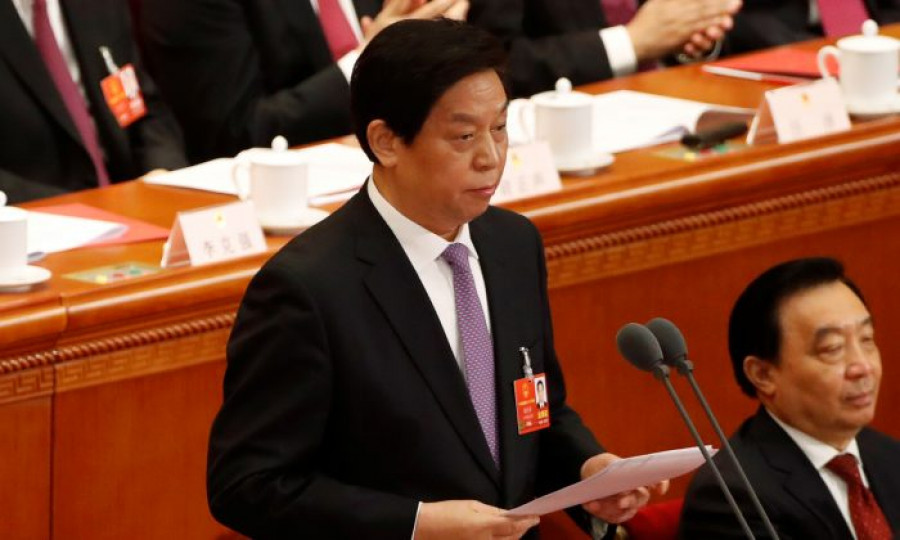National
Visiting Chinese Speaker may have speculations of left unity to shrug off
Even in the past, China has clearly expressed its wish for a strong and united communist party in Nepal.
Purushottam Poudel
Li Zhanshu, head of the Standing Committee of the Chinese National People’s Congress, arrives in Kathmandu on Monday on a three-day visit at the invitation of Speaker Agni Parsad Sapkota. The Chinese Speaker’s delegation is coming ahead of the federal and provincial elections on November 20.
Earlier, Gou Yezhou, vice-minister of the International Department of the Communist Party of China (CPC), had visited Kathmandu in February, 2018 when the two communist parties—CPN-UML and CPN (Maoist Center)—were in merger talks after the landslide victory of their alliance in the 2017 general elections.
At the time, Gou’s visit to Kathmandu was considered instrumental in effecting the merger of the two communist parties, a union which lasted until March 7, 2021 before the Supreme Court annulled it.
Even in the past, China is believed to have played an important role in the forging of the left alliance. Chinese visits to Kathmandu prior to the merger of Nepali communist parties as well as ahead of the dissolution of the Nepal Communist Party (NCP) hinted at China’s role in the communist unity.
After realising that communist unity could not be maintained, the Chinese leaders who descended in Kathmandu under the leadership of Gou had enquired about the prospect of communist cooperation in the 2022 elections, say UML insiders.
In this backdrop, whenever there’s a high-level visit from the north, especially in times of political uncertainty, observers in Nepal are all ears for any hint of unity between Nepal’s communist forces, which the Communist China sympathises with.
UML Secretary Yogesh Bhattarai, however, rejects the possibility of a left alliance this election. Bhattarai also ruled out Chinese involvement in the formation of the left alliance before the last general elections.
“It was us, Nepal’s communists, who made the left-alliance possible. If that happens again, it will again be us who will be responsible. There will be no Chinese involvement,” Bhattarai said.
Kalyan Sharma, president of Nepal-China Friendship Society, sees Li’s visit as part of a regular process. This shows the importance China attaches to Nepal, he says, delinking the visit from a communist alliance.
“I would be wrong to argue that all Chinese visits to Nepal are only aimed at achieving left unity,” he said.
There is also speculation that China wants to have a level of influence over the Nepali parliament after it passed the MCC Nepal compact against China’s wishes—and its Speaker’s visit is aimed at that goal.
Trailokya Raj Aryal, another China hand, disagrees. “Nepal, with its low economic dynamism, has no importance for the likes of the US and China. The Nepali claim that the nation is significant from a strategic standpoint is misplaced,” he told the Post.
“Nepalis have a propensity to interpret everything to suit their preferences. But in the big picture, Nepal has no significance for major powers.” Yet Aryal too thinks the visit has nothing to do with a possible communist alliance.
Nevertheless, a close aide of Prime Minister Sher Bahadur Deuba, who chose to remain anonymous, espies political meaning behind the visit. “How can such a high-profile visit on election-eve not have a political meaning?” he asks.
Yet he refuses to elaborate on the ‘political meaning’.
The ruling coalition, which has agreed to contest the upcoming polls through an alliance, is struggling with seat-sharing. So long as the seat-sharing process is not complete, say UML and Maoist insiders, the possibility of a broader left alliance cannot be ruled out. The Maoist Centre and the CPN (Unified Socialist) have already agreed to contest elections on a common manifesto.
But those closely associated with China in Nepal claim that Beijing wants a stable neighbourhood in which both countries can develop in harmony, and Li’s visit is aimed at the same.
Chinese professor Wang Chung, a Nepal and South Asia expert at Yunnan University, has a different opinion on the Chinese Speaker’s Nepal visit.
Political stability in Nepal is in China's long-term interest, says Wang. “China believes Nepal's growth will benefit from the communist unity. A stable government is required for the nation to thrive, which in turn is not possible without a powerful and stable party at the helm.”
However, Maoist Centre leader Haribol Gajurel sees no possibility of a left alliance for the upcoming elections.
“We do not see any prospect of an alliance between the Maoists and the UML before the elections,” he said.
On the day of his Nepal visit, Li is scheduled to hold delegation-level talks with Speaker Agni Sapkota, who hosts a banquet in honour of the visitors.
The Chinese Speaker will on September 13 pay a courtesy call on Prime Minister Sher Bahadur Deuba. He is also scheduled to meet the Chairperson of the National Assembly Ganesh Prasad Timilsina and Minister for Foreign Affairs Narayan Khadka the same day.
Li will also see CPN-UML chair and former Prime Minister KP Sharma Oli. He will have a separate meeting with CPN (Maoist Centre) chair Pushpa Kamal Dahal on September 13.
On the last day of his Nepal visit on September 14, he will call on President Bidya Devi Bhandari.
Speaker Li will be accompanied by over eight dozen delegates.




 16.12°C Kathmandu
16.12°C Kathmandu















